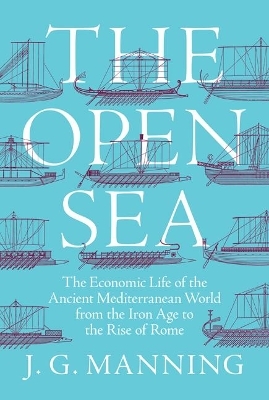
The Open Sea
Princeton University Press (Verlag)
978-0-691-15174-8 (ISBN)
A major new economic history of the ancient Mediterranean world
In The Open Sea, J. G. Manning offers a major new history of economic life in the Mediterranean world in the Iron Age, from Phoenician trading down to the Hellenistic era and the beginning of Rome's imperial supremacy. Drawing on a wide range of ancient sources and the latest social theory, Manning suggests that a search for an illusory single "ancient economy" has obscured the diversity of lived experience in the Mediterranean world, including both changes in political economies over time and differences in cultural conceptions of property and money. At the same time, he shows how the region's economies became increasingly interconnected during this period.
The Open Sea argues that the keys to understanding the region's rapid social and economic change during the Iron Age are the variety of economic and political solutions its different cultures devised, the patterns of cross-cultural exchange, and the sharp environmental contrasts between Egypt, the Near East, and Greece and Rome. The book examines long-run drivers of change, such as climate, together with the most important economic institutions of the premodern Mediterranean--coinage, money, agriculture, and private property. It also explores the role of economic growth, states, and legal institutions in the region's various economies.
A groundbreaking economic history of the ancient Mediterranean world, The Open Sea shows that the origins of the modern economy extend far beyond Greece and Rome.
J. G. Manning is the William K. and Marilyn M. Simpson Professor of History and professor of classics at Yale University. He is the author of The Last Pharaohs: Egypt under the Ptolemies (Princeton) and Land and Power in Ptolemaic Egypt, and coeditor of The Ancient Economy: Evidence and Models.
List of Illustrations ix
Preface xiii
Acknowledgments xxv
Chronology xxvii
I History & Theory
Introduction History, Theory, and Institutions: Approaching the Ancient Economy 3
1 New Directions and Broader Contexts in the Study of Premodern Economies 17
2 Ancient Economies: Taking Stock from Phoenician Traders to the Rise of the Roman Empire 39
3 Bronze, Iron, and Silver: Time, Space, and Geography and Ancient Mediterranean Economies 72
II Environment & Institutions
4 Agriculture and Labor 109
5 The Boundaries of Premodern Economies: Ecology, Climate, and Climate Change 135
6 The Birth of "Economic Man": Demography, the State, the Household, and the Individual 173
7 The Evolution of Economic Thought in the Ancient World: Money, Law, and Legal Institutions 193
8 Growth, Innovation, Markets, and Trade 216
9 Conclusions 262
Appendix Climate Data 271
Notes 277
Key Readings 329
Bibliography 333
Index 405
| Erscheint lt. Verlag | 3.4.2018 |
|---|---|
| Zusatzinfo | 50 b/w illus., 6 tables, 3 maps |
| Verlagsort | New Jersey |
| Sprache | englisch |
| Maße | 155 x 235 mm |
| Gewicht | 794 g |
| Themenwelt | Geschichte ► Allgemeine Geschichte ► Vor- und Frühgeschichte |
| Geschichte ► Teilgebiete der Geschichte ► Wirtschaftsgeschichte | |
| ISBN-10 | 0-691-15174-1 / 0691151741 |
| ISBN-13 | 978-0-691-15174-8 / 9780691151748 |
| Zustand | Neuware |
| Haben Sie eine Frage zum Produkt? |
aus dem Bereich


